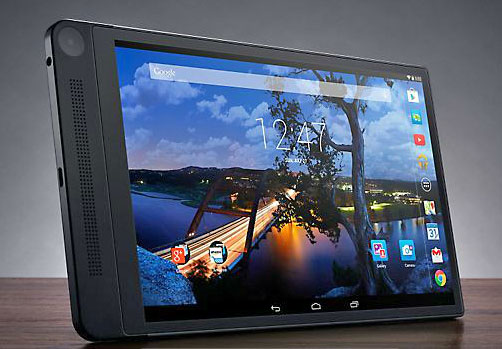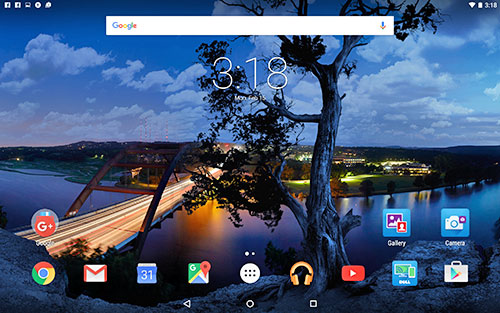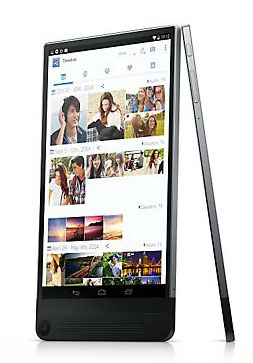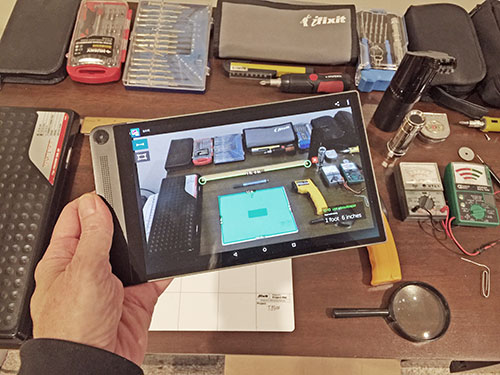« Follow-up on iPad Pro and Apple Pencil | Main | Cat S60 — More than the naked eye can see »
February 15, 2016
Keeping an eye on the level of technology offered in consumer tech: Dell Venue 8
The consumer market is really, really tough. Sure, massive fortunes can be made off it thanks to the sheer size of it, and thus the potential of millions of units sold. But few products ever make it into that sales stratosphere, and the competition is brutal. Make one mistake, be it in technology, manufacturing, marketing or just about anywhere else, and the product tanks, expensively. Add to that the fickle taste of consumers, the unpredictability of trends, a lightening-quick product cycle pace, and the true successes are few and far between. Leaving some very good and often excellent products behind. Or at least underappreciated.

That all came to mind as I spent the weekend playing with my latest impulse buy, a 7000 Series Dell Venue 8 tablet. First available early 2015, the Venue 8 is an 8.4-inch consumer tablet that's part of Dell's efforts to establish itself in mobile technology. That effort had seen the short-lived Dell Venue smartphones and then a re-introduction of the line late 2013 as tablets. Venues tablets are available both in Android as well as Microsoft Windows versions, the latter as the Venue Pro.
So why did I get a Venue tablet? In part because I've always liked Dell. I liked the old Dell Axim handhelds of the Pocket PC era, I like the various rugged Dell tablets and notebooks we've tested here at RuggedPCReview.com, and I liked Dell's decision to take the company private so as not to be at the mercy of Wall Street analysts whose quarterly growth expectations must be met lest they "worry" or, worse, become "concerned."
In this instance, I received an email alerting to a special deal on the Venue 8. I decided to check it out as the trusted Google Nexus 7 I'd been using as my personal small Android tablet, and also as a point of reference whenever we test a rugged Android device, had outlived its usefulness. After the latest OS upgrade — which to Google's credit was always quickly available for the Nexus 7 — the device had become so sluggish as to be useless. Could I not just ask one of our sponsors for a long-term loaner? I could, but I always like to have something that's truly mine and not subject to a sudden unexpected recall for inventory purposes or such.
Add to that that the deal was very sweet. Just US$199 for a 16GB Dell Venue 8 7840 running Android 5.1 (Lollypop). That's $200 off the regular US$399, and shipping included. Fast shipping, too, as the package arrived at my doorstep just a day and a half after I ordered the tablet.
Now, since I am writing this for the RuggedPCReview.com blog, let me make something clear right off the bat: the Venue 8 is NOT a rugged device. It's of the standard consumer/business variety that Dell has always specialized in. So why the write-up if it's not a rugged device? Because it's always good to see what consumer technology is up to and what consumers expect, and get, for their money. With the massive global reach of smartphones and tablets, what consumers expect from their personal gear has a direct impact of what they expect from rugged gear. So there.
If that's the case, and according to our experience it is, then every manufacturer of rugged mobile computing gear should get a Venue 8 and study it. Because consumers get an awful lot of very advanced technology with this tablet, even at its US$399 list price.
First, there is the 8.4-inch display with massive 2,560 x 1,600 pixel resolution. That's 359 pixels per inch and incredibly sharp. It's an OLED (organic light emitting diode) screen that's also vivid with deep blacks and intense colors. The display has absolutely perfect viewing angles from any direction. Brightness ranges, depending on what review you want to believe, from 250 to 430 nits. I consider it very bright. The folks at Anantech actually didn't like the display very much in their review of the Venue 8 (see here). But compared to most displays in rugged devices, it's very, very good.

For a processor, the Venue 8 has a quad-core Intel Atom Z3580 with a maximum burst frequency of 2.33GHz. The Z3580 is part of the "Moorefield" lineup of Atom chips and designed specifically for smartphones and tablets. It's different from Bay Trail chips in that it's not using Intel HD Graphics, but a PowerVR Rogue G6430. There's 2GB of RAM and 16GB of eMMC mass storage, plus up to 64GB via externally accessible micro SD card. There's Bluetooth 4.0 and fast 802.11ac WiFi via an Intel 7260 WiFi + BT 4.0 module. And the 21 watt-hour battery is supposed to last 9.5 hours.
The Venue 8 has not just two, but four cameras. Yes four. There is the standard frontal conferencing cam (2mp), there is the 8mp rear-facing documentation camera, and then there are two supplementary 1mp cameras that work in conjunction with the 8mp to allow depth measurement as well as adjusting focus on a picture after it's been taken. You don't see that anywhere else.

The whole thing is packaged into an anodized aluminum case that measures 8.5 x 4.9 inches and is less than a quarter of an inch thick. This tablet makes the sleek iPhone 6 look a bit stout. Weight is 10.75 ounces.
So how well does the Venue 8 work?
Very well. The Venue 8 has a exceptionally high quality feel to it, in that Apple-esque way that makes it feel like the device is milled from a solid block of metal. And the OLED display is just gorgeous with its rich, vibrant colors and deep blacks. It's like looking at a particularly good Plasma TV compared to regular LCD TV. I/O is minimal. There's the tiny micro-USB jack for charging. There's the micro SD card caddy. A headphone jack. And then the small volume rocker and power switch.
What's a bit unusual is the asymmetrical layout with 3/16th of an inch bezels on three sides and then a much heftier 1-3/16 on the 4th. That's good news for the speakers which get much more real estate than they usually get in a small tablet, and they face forward for good sound. That makes for a largish area where to hold the tablet, but both the front and the rear main cameras are also located there, which means it's easy to inadvertently cover them. Overall, I like the arrangement.
In terms of performance, the Venue 8 is quick. Overall, few of the Android devices that I've tested or worked with are as smooth as anything that comes out of Apple, with a degree of stuttering here and there common. There's very little of that on the Venue 8. It's generally quick and responsive, and a pleasure to use.
Literally billions are familiar with Android now, which means that whatever quirks Android has — and it still has its fair share of them — do not affect its popularity. The vast variety of Android hardware and the numerous versions of Android itself, however, still mean that some apps are either not available for a particular device or version, or they are not optimized for your particular device.
Some reviewers have complained about very small text and icons on the Venue 8 due to its very high resolution on a fairly small display. I did not find this to be an issue under Android Lollipop, and certainly much less of an issue than it is on most small Windows tablets.
The "depth" camera assembly with its main 8mp camera flanked by two 1mp complementary cameras has me baffled. The idea here is that the two subsidiary cameras allow to capture depth information that can then be used to do a variety of things to a picture, like focus on certain areas, applying filters to certain areas, or even measuring distances and areas. It can also be used to widen or narrow the depth of field for artistic purposes.

Unfortunately, this is only marginally documented, and didn't work all that well for me. On top, the 8mp camera itself isn't nearly as good as most people have come to expect from their smartphone cameras. So that's a disappointment. It does, however, still work better than most cameras in rugged systems. I understand the need to differentiate a product from the competition, but in this instance I'd have preferred one really excellent documentation camera instead of the triple camera experiment.
Battery life is excellent, especially considering there's only 20 watt-hours, and the device is less than a quarter inch thick. Battery life is so good that, like in iPads, it simply ceases to be an issue.
So what does it all mean as far as rugged computing is concerned? Since it's not a rugged device, nothing directly. However, the Venue 8 demonstrates the level of technology and features that's available to consumers for very little money. And the impressively high quality. The vibrant OLED display with its very high resolution. All for US$399 list, or the ridiculously low US$199 on special.
And what does it mean as far as manufacturers of rugged tablets are concerned? Simply that the consumer market is spoiling consumers with advanced technology that's hard to match in low-volume ruggedized gear with much longer product cycles. So I don't expect to find all this enticing high technology in rugged computing products for the job. But it definitely IS good to keep an eye on what consumers are getting for very little money. Because those consumers then want the same in their professional gear.
Posted by conradb212 at February 15, 2016 7:55 PM

















